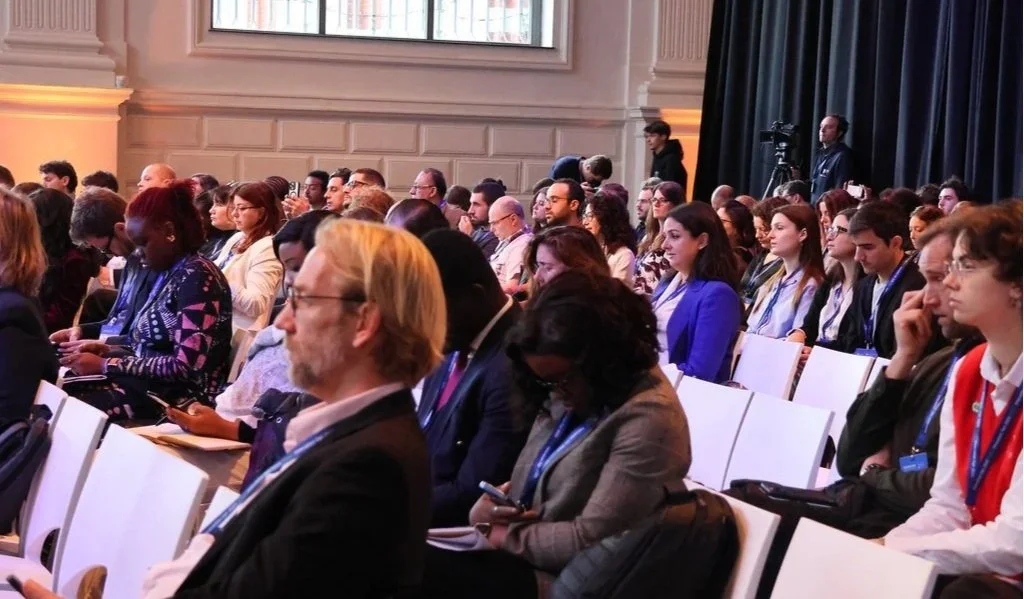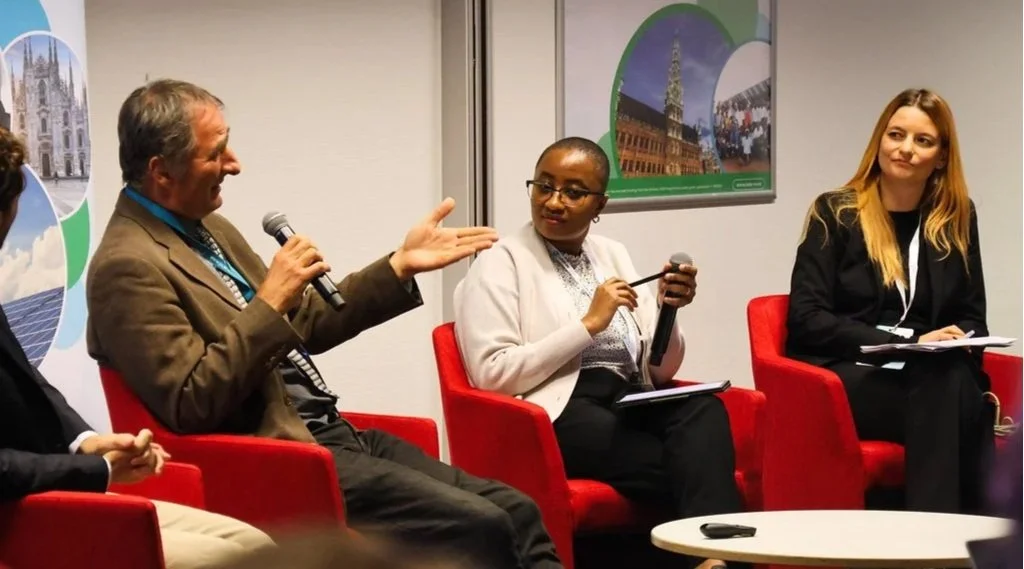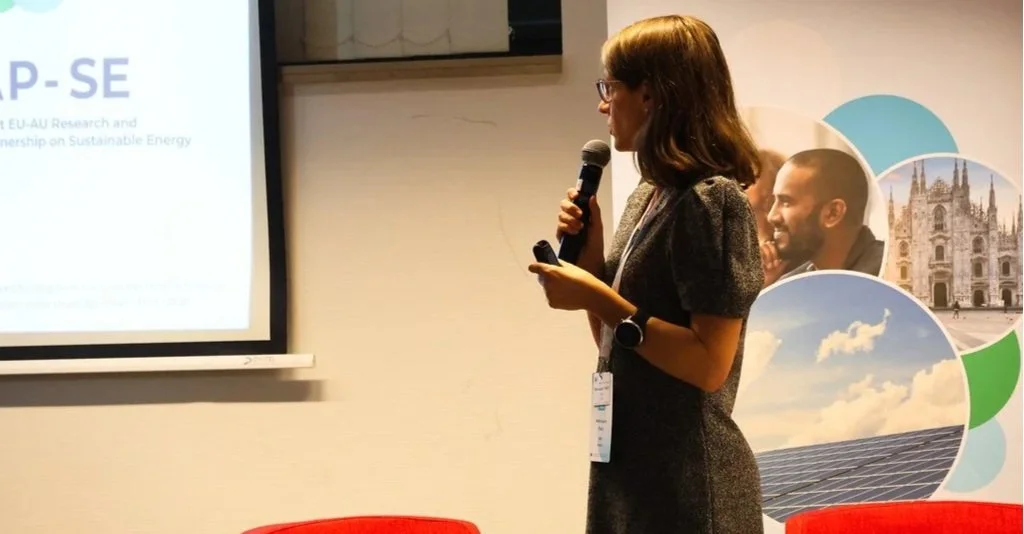By The Youth Café
As the world prepares for a more ambitious phase of Africa–Europe cooperation on sustainable energy, The Youth Café had the privilege of joining the Annual Stakeholder Forum of the Long-Term Joint EU-AU Research and Innovation Partnership on Renewable Energy (LEAP-RE), held on 21 October 2025. This gathering marked a historic milestone: the official transition from LEAP-RE to its successor, the Long-Term Joint EU-AU Research and Innovation Partnership on Sustainable Energy (LEAP-SE).
For us, the Forum was more than a policy event, it was a clear signal that the era of meaningfully involving youth in shaping Africa’s green transition has truly begun.
A New Chapter: LEAP-SE’s Vision for a Sustainable Energy Future
The conclusion of the LEAP-RE programme delivered a strong foundation of AU–EU collaboration in clean energy. But LEAP-SE is poised to go further. The six-year initiative introduces a deeper integration of Research and Innovation (R&I), aiming to accelerate sustainable energy access and climate resilience across both continents.
What sparked excitement among our team was the programme’s unapologetic recognition of youth as indispensable actors. With the majority of Africa’s population under 35, the shift toward youth-centered research, innovation, and entrepreneurship is long overdue, and LEAP-SE wholeheartedly embraces it.
Youth as Co-Creators, Not Participants
At the Forum, The Youth Café pushed forward a bold but necessary message: youth must be treated as co-creators, not passive beneficiaries. We championed the “Youth as Co-Creators” approach, which ensures young innovators, researchers, and entrepreneurs are directly integrated into the programme’s governance, planning, and implementation.
Our advocacy resonated. Stakeholders, from policy leaders to funding agencies and private sector partners, affirmed their commitment to a model of collaboration that includes youth as equal partners within the programme’s “quadruple helix” design: government, academia, industry, and civil society.
This marks a significant victory for youth-led advocacy and a powerful acknowledgment of the role young people must play in steering Africa’s energy transition.
LEAP-SE’s Multi-Annual Roadmaps: Where Youth Will Lead
LEAP-SE’s operational structure is guided by seven Multi-Annual Roadmaps (MARs). These areas represent high-impact, cross-sectional challenges that urgently require youth-led solutions. Three in particular stand out for their direct relevance to young innovators:
1. Clean Cooking & Domestic Uses
Youth entrepreneurs are uniquely positioned to design affordable, culturally grounded clean-cooking solutions capable of transforming millions of households.
2. End-of-Life Management & Circular Economy
As energy systems expand, managing e-waste sustainably becomes essential. Youth-led recycling, repair, and circular-economy initiatives can redefine the lifecycle of energy technologies.
3. Productive Uses of Energy
Youth innovation is critical in linking sustainable energy to job creation in agriculture, manufacturing, digital enterprise, and rural development.
These roadmaps offer tangible, near-term opportunities for youth to access funding, shape policy, and scale solutions.
Beyond Research: Building the Workforce for the Green Economy
One of the standout messages from the Forum was the urgent need for a skilled green workforce. Sustainable energy systems cannot be scaled without technicians, researchers, project managers, innovators, and entrepreneurs.
This is both an opportunity and a challenge for young Africans:
The opportunity: LEAP-SE projects offer access to multi-million-euro, transnational R&I collaborations.
The challenge: Youth must acquire advanced technical and managerial skills to compete and lead.
During the sessions, we highlighted the growing training needs across three areas:
International Grant Management & Proposal Writing
Navigating complex AU–EU funding schemes is itself a highly valuable skill.Understanding Technology Readiness Levels (TRLs)
Youth innovators must know how to move ideas from early-stage concepts (TRL 1–2) into market-ready solutions (TRL 6–9).Cross-Continental Partnership Building
LEAP-SE requires diverse consortium structures—youth need the skills to form and manage partnerships across academia, government, and industry.
The Youth Café is prepared to bridge these skill gaps by championing targeted capacity-building programs for aspiring youth innovators.
Fueling the Next Generation of Green Entrepreneurs
A key structural feature of LEAP-SE is that all funded consortia must include at least one research institution and one private-sector partner. For youth entrepreneurs, this is nothing less than a roadmap to scale: partner with a research institution or company, match strengths, and innovate together.
The Forum offered fertile ground for such cross-sector networking—one of many reasons youth should prepare early for the LEAP-SE 2025 and 2026 calls for proposals.
Our Commitment: Youth at the Center of Africa’s Energy Future
Our engagement at the LEAP-RE Stakeholder Forum wasn’t passive—we participated, influenced, and amplified youth perspectives at every turn. The message was clear: young people cannot simply inherit the outcomes of sustainable energy strategies; they must shape them.
To every young African innovator, researcher, engineer, or activist, here’s your call to action:
Follow LEAP-SE funding calls closely—the current 2025 call is live, and the 2026 call is approaching.
Research African and European consortium partners involved in LEAP-SE. These institutions are your potential collaborators.
Think Co-Creation—design solutions with multi-stakeholder scalability and long-term sustainability in mind.
The Youth Café remains committed to empowering young people with skills, resources, and networks to seize the moment. We will continue monitoring and translating LEAP-SE opportunities to ensure Africa’s youth are not just included, they are leading.
The future of sustainable energy is being built now. And it needs the power, creativity, and vision of young people.



